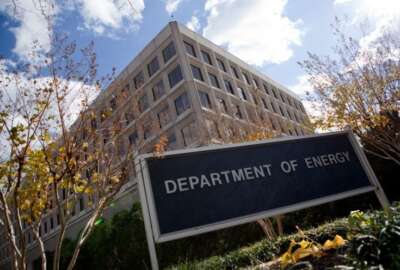To listen to the Federal Newscast on your phone or mobile device, subscribe in PodcastOne or Apple Podcasts. The best listening experience on desktop can be found using Chrome, Firefox or Safari.
- Pentagon officials say a full-year continuing resolution would cut back their spending plans by more than $20 billion this year. Even though 2021 spending levels were only about $8 billion below what DoD proposed for this year, a full-year CR would lead to billions of dollars more that the department can’t actually spend, because the funding is in the wrong accounts. This year’s 2.7% military pay raise compounds the problem: the raise has already taken effect, but under a CR, personnel accounts wouldn’t have the funds allocated to pay for it. (Federal News Network)
- Thousands of soldiers are officially refusing to get the COVID-19 vaccine. More than 3,000 members of the Army are flat out refusing to get the coronavirus shots. The service already said that it would separate service members who do not get vaccinated. So far, the Army has relieved six active duty leaders and sent out almost 3,000 reprimands. 97% of the active duty force and 78% of the Army Reserve have gotten at least one shot. Reserve members have until this summer to get fully vaccinated.
- Like just about every other employer, the Army is dealing with a tight job market — so officials have decided it’s time for a big bump in military recruiting bonuses. Sign-on bonuses for some of the hardest-to-fill specialties will reach $50,000 this year, up from a previous cap of $40,000. Army officials said they’ve had a tougher time recruiting new soldiers during COVID-19, partly because of school closures. The service is aiming to induct more than 57,000 new soldiers this year, about the same as last year. (Federal News Network)
- The Navy is prioritizing self-awareness and self-correction in its sailors to better the service. Chief Naval Officer Admiral Michael Gilday released a new charge of command this week. The strategy will incorporate new emphasis on self-awareness in leadership curriculum. The Navy is also revamping its Navy Safety Center into a safety command. That organization will evaluate how the service evaluates risk. (Federal News Network)
- DHS launches a new training program for its employees. The Climate Change Professionals Program aims to recruit recent graduates and current Homeland Security Department employees to focus on adapting the agency’s mission to climate change and improving its resilience. Secretary Alejandro Mayorkas says the goal of this two-year training program is to develop the next generation of climate experts and improve the climate literacy of the workforce. DHS released the first three job announcements for current employees and soon-to-be college graduates to apply for. The program will include 10-to-12 students and kick off in June. (Federal News Network)
- Several agencies will begin working together to advance clean energy projects on public lands. The departments of the Interior, Agriculture, Defense, Energy and the Environmental Protection Agency announced a memorandum of understanding to establish interagency coordination teams that prepare environmental reviews and accelerate renewable energy decision making on lands managed by USDA and the Interior Department. The initiative supports the Energy Act of 2020, which sets out to produce 25 gigawatts of clean energy on public lands by no later than 2025.
- Feds could soon have new training available to help them identify products with IT security risks. The Senate passed the Supply Chain Security Training Act this week. It would create a standard supply chain security training program for employees responsible for purchasing services and equipment. The General Services Administration would be responsible for creating the program, in consultation with the departments of Defense and Homeland Security. The Office of Management and Budget would develop guidance for adopting and using the new training.
- Death benefits for federal employees killed on the job may increase soon. Legislation introduced Tuesday would raise the benefit for survivors by 900% to $100,000. The bill would also increase the funeral expense payment to 88-hundred dollars. The federal workforce averaged 24 deaths on the job per year before the pandemic, according to the bill’s sponsors. If passed, this would be the first change in the death benefit since 1997. (National Treasury Employees Union)
- Top members on the House Oversight and Reform Committee are asking agencies what steps they’ve taken to make it easier to help their constituents access federal services. Government Operations Subcommittee Chairman Gerry Connolly (D-Virg.) and Ranking Member Jody Hice (R-Geor.) asked agencies for an update implementing the Creating Advanced Streamlined Electronic Services for Constituents, or CASES Act. The law requires agencies to accept digital signatures for the privacy authorization forms constituents must submit before a member of Congress can contact agencies on behalf of their behalf.
- The Postal Service’s Board of Governors has named a new chairman. The board unanimously elected Roman Martinez, a Republican member, to serve as its next chairman. Martinez will take over for Democrat Ron Bloom, a former member of the board whose term expired in December. The board also named Anton Hajjar, the former general counsel of the American Postal Workers Union, to serve as its vice chairman. Martinez said he supports Postmaster General Louis DeJoy and his 10-year reform plan. (Federal News Network)
- The nominee to lead Homeland Security’s intelligence branch said improving employee morale is a top priority. Kenneth Wainstein said he wants to improve career opportunities and work-life balance for employees at the Office of Intelligence and Analysis. The DHS organization has consistently ranked as one of the worst places to work in the federal government. During his Senate confirmation hearing this week, Wainstein pledged to take a hard look at the problem. “A fundamental issue and challenge for me, if I walk into I&A, is to assess what the morale of the workforce is, and take every measure I can to improve that morale, which improves the effectiveness of the organization.” (Federal News Network)
- Two senior executives at the General Services Administration are moving back to industry. Gerard Badorrek, the agency’s CFO for the last seven years, is leaving on January 21. He said he plans to return to industry. One of Badorrek’s biggest accomplishments was the move to robotics process automation across GSA that saved hundreds of hours. Additionally, Judith Zawatsky, GSA’s assistant commissioner in the Office of Systems Management, left after 15 years earlier this month. She started a new position with Gartner. Zawatsky was best known for modernizing federal acquisition systems, including the new sam dot gov platform.
Copyright
© 2025 Federal News Network. All rights reserved. This website is not intended for users located within the European Economic Area.




